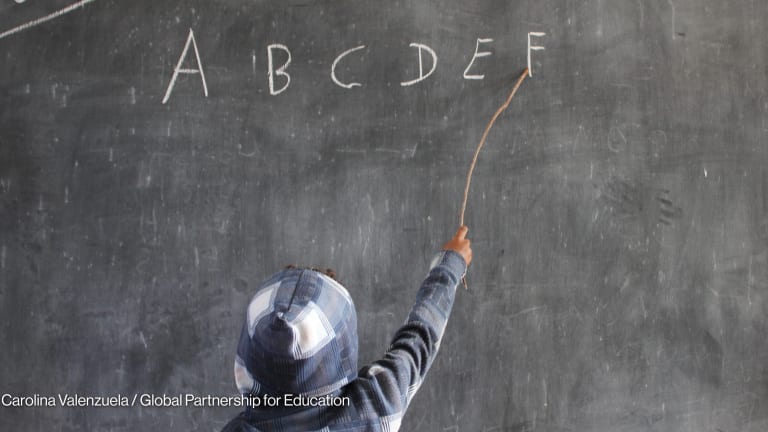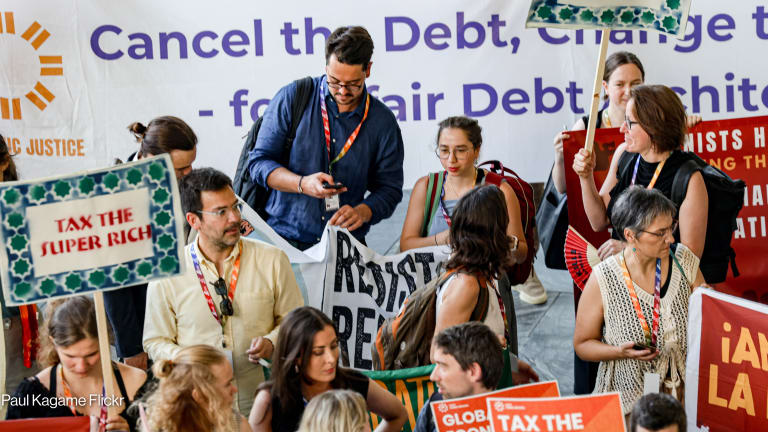
LONDON — A European Parliament resolution against spending aid on commercial schools in lower-income countries has sparked renewed debate over the role of the private sector in global education.
Earlier this month, the European Parliament voted overwhelmingly in favor of a resolution that called on the European Commission and European Union member states to channel more official development assistance into education — but, it specified, not into for-profit schools.
That caveat has provoked strong reaction on both sides of the debate over the growing role of low-cost, for-profit school chains in meeting education needs in lower and middle-income countries. The private sector currently accounts for approximately 14 percent of primary education and 20 percent of secondary education provision in low-income countries, and these levels have grown rapidly since the 1990s, according to World Bank data. Among poor urban communities, such as Kampala in Uganda, private provision can be as high as 80 percent.
Principle 12 of the EU resolution states that, “in accordance with” Sustainable Development Goal 4.1 and Article 26 of the Universal Declaration on Human Rights, the EU “must not use ODA to support private, commercial educational establishments, which do not uphold the union’s principles and values.”
The ruling is non-binding, but some education advocates who have spent years campaigning against what they see as the “commercialization of education” in developing countries have heralded it as a major win and an indication that the policy tide is turning.
“The evidence is clear: it’s only by funding quality public education systems that we can overcome poverty and guarantee social justice in developing countries. The European Parliament positions the EU as the leader it should be to guarantee public services for all,” Carole Coupez of the French Education Coalition said in a press release.
Advocates also hope the resolution will inform the Global Partnership for Education’s stance on private actors. GPE, the world’s largest education funder, is currently considering a private sector engagement strategy.
However, opponents in the debate say the EU clause is short-sighted and claim there is a growing acceptance that low-income countries need both public and private schools. The U.S. Agency for International Development published a new education policy earlier this month saying it would do more to engage nonstate actors, including private and for-profit schools.
Some warn the EU resolution risks penalizing small private schools, which are increasingly delivering education to a large number of children in developing countries, and not just the large international school chains its supporters appear to be targeting.
“We must remember that the bulk of the nonstate market is made up of local entrepreneurs who have established schools in their local community. They are not making millions of dollars but are filling a gap in the market,” Aashti Zaidi Hai, director of the Global Schools Forum, a network of nonstate schools operating in low- and middle-income countries, said. The European Parliament’s position could have a chilling effect on efforts to attract innovative finance into global education, she added.
Others objected to the human rights language used in the resolution. “Many governments see these schools as a crucial part of their education systems, providing education for low-income communities where government services cannot reach,” said Irene D. Pritzker, president of the IDP Foundation, which supports local, low-fee private schools in Ghana. There is nothing “in human rights law that limits the use of public resources for private providers. Indeed, human rights law protects the liberty of parents to choose private schools.”
The global education sector has been locked in a long-running battle over the role of private versus state actors in delivering education.
A lobby of teachers’ unions and human rights campaigners, backed by the United Nations, argues that the state should be the sole provider of schooling. They have been campaigning hard against the fast-growing private education sector, with backing from senior U.N. figures, including Deputy Secretary-General Amina Mohammed.
However, others see the private sector as crucial to addressing the global learning crisis. This includes prominent funders, including the U.K. and U.S. governments and the World Bank, all of which have financed for-profit school chains and education public-private partnerships.
What next for Liberia's controversial education experiment?
In September, the rebranded Partnership Schools for Liberia program tentatively entered its third year — but with no funding confirmed.
International for-profit school chains have been the main target for human rights campaigners — and the reference to “commercial educational establishments” in the resolution indicates it is directed at them, according to Sylvain Aubry, a research and legal advisor at the Global Initiative for Economic, Social and Cultural Rights.
“The resolution makes clear that for-profit private providers such as … Bridge International Academies ... Omega Schools ... or APEC schools ... which are commercial establishments, do not align with EU’s principles and values,” he said in the press release.
However, some have said the resolution’s language is too vague and open to interpretation. A spokesperson for Bridge, one of the most high-profile international school chains, told Devex the resolution does not apply to them since they are a social enterprise, as opposed to a commercially focused business.
John Rendel, founder and CEO of Promoting Equality in African Schools, a chain of nonprofit secondary schools in Uganda and Zambia, said he agrees that ODA should not directly fund commercial schools — but it could be used to help regulate them, which could drive up standards across public and private schools alike.
“Market failures, such as exam results gaming, mean commercial low-cost private schools are only ever a symptom of the failure of government provision rather than a solution to it. As a result, the marginal aid penny shouldn’t support these schools because funding them reduces the sense of urgency required to improve the state system,” he told Devex.








